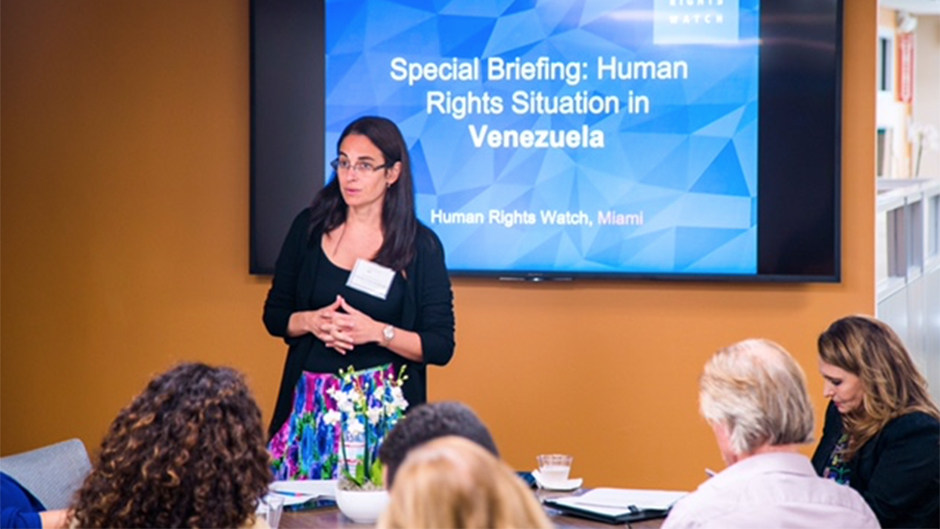For Tamara Taraciuk Broner, the humanitarian crisis in Venezuela hits home. Venezuela provided her Argentinian parents refuge when their homeland was controlled by a brutal military junta. Now a senior researcher with Human Rights Watch, Taraciuk Broner was born in Venezuela, but was able to return to Argentina as a young child after the repressive government there was toppled.
Today she views her job as helping Venezuelans who have fled their own repressive regime return home one day. “That is a very important part of what we do,” she told a roomful of academics, students and members of the community at a March 8 luncheon at the UM Institute for Advanced Study of the Americas (U-MIA).
In welcoming the group, Dr. Felicia Marie Knaul, director of U-MIA, said the center was “extremely pleased to partner with Human Rights Watch” and their researchers who work throughout the world to promote social justice and human rights.
”I am the child of a concentration camp survivor,” Knaul said. “It breaks my heart to hear about these abuses, injustices, but we have to bear witness. There is no excuse for our silence, for not doing something.”
Taraciuk Broner worked undercover in Venezuela for Human Rights Watch for eight years, while the late President Hugo Chavez was still in power, and continued her work, contacting victims of abuse, lawyers and others affected by the repressive regime of his successor, Nicolas Maduro. Those observations culminated in reports and videos that, she said, document the enormous concentration of power that allowed the Chavez and Maduro governments to commit all kinds of abuses.
Maduro further solidified his authoritarian hold when his supporters took control of the National Assembly, increasing violence against opponents, and pushing the country into an economic decline that has caused hyperinflation, severe shortages of food and medical supplies, and declining health.
In early 2017, Taraciuk Broner said, a Venezuelan Ministry of Health report showed that, the year before, maternal mortality had increased by 65 percent, infant mortality by 30 percent and malaria cases by 76 percent. These figures put Venezuela above the threshold of a crisis, according to the World Health Organization.
“Things have gotten worse since then,” she said, noting that the minister who authored the report was fired. Adding to the suffering in Venezuela, Taraciuk Broner said, is Maduro’s denial of a humanitarian crisis, which Human Rights Watch’s meticulous fact-gathering has corroborated. By denying the existence of a crisis, she said, Venezuela has closed the door to international aid that could alleviate some suffering and death.
“We don’t do things for the sake of it, we do so to provoke change,” said Taraciuk Broner, “When we say things happen it’s because we can corroborate every assertion we make.”
Taracuik Broner said the reports and graphic videos disseminated by Human Rights Watch has spread knowledge of the humanitarian crisis worldwide. But now, she said, the organization faces the daunting task not only of maintaining interest in the country but also generating sufficient pressure for change.
“We are trying to advocate for the governments in the regions and beyond to redouble pressure for Maduro to end abuses,” she said.
Specifically, Human Rughts Watch recommends countries impose targeted sanctions against high-ranking Maduro government officials who are implicated in abuses. Such sanctions could include freezing their assets and blocking their entrance to specific countries, she said.
Only the United States, Canada and the European Union have implemented sanctions. But Human Rights Watch will continue pressuring other countries to follow suit, she said.

